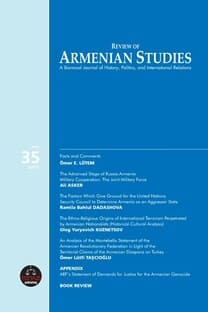HOLLANDA'DA YAŞAYAN ERMENİLERİN VERİLERİ: EĞİTİM, İKAMETGAH VE DOĞUM YERİ HAKKINDA İSTATİSTİKLER
Ermenistan ve diaspora Ermenileri, Ermeniler arasında birlik oluşturmakiçin kendine has bir milliyetçilik süreci uygulamaktadır. Bu birlik oluşturmasüreci, “ötekileştirmek” süreci ile el ele ilerlemektedir. Bu ötekileştirme sürecibir tarafın “kendi” halkı arasında birlik oluşturması için çok önemlidir. Zirabu süreçte bahsi geçen tarafın “kendi” halkı, dışarıdan tehdit oluşturduğuiddia edilen “ötekiye” karşı kendisini savunması için birbirine kenetlenmesigerekecektir. Bu süreçte, “ötekinin” Ermeni halkını tamamıyla yok etmeğiöngördüğü iddia edilmektedir. Ermeniler arasında bu “öteki”, Türkler’dir.Hollanda’da yaşayan Ermenilerin, yani Hollanda’daki Ermeni diasporasının,verilerine bakarken bu çok önemli bir karşılaştırma noktasıdır, çünküErmeniler kendilerini yerli olan Hollandalılarla değil de Hollanda’da yaşayanTürklerle karşılaştırmaktadırlar. Hollanda’daki Ermenilerin, yani HollandaErmenilerinin, verilerine bakarken Hollanda’daki Ermeni diasporası ile ilgilibaşka önemli sonuçlara da ulaşılmaktadır. Bu istatistiki araştırma sırasında,diğer verilerin yanında, eğitim, ikametgâh yeri ve evlilik gibi verilereodaklanılmaktadır
THE ARMENIAN DIASPORA IN THE NETHERLANDS: STATISTICS OF EDUCATION, RESIDENCE, AND PLACE OF BIRTH
Armenia and also diaspora Armenians have a distinct form ofnationalism as a part of their process to create unity amongst their own“people”. This process of nation-building coexists with the process ofcreating “the other” against which you can argue that it is of highimportance to create unity amongst your ‘own’ people in order to beprepared to defend themselves against this perpetrated “other”. The storyis that this “other” is out to destroy the people as a whole. AmongstArmenians this “other” is portrayed as being “the Turks”. When lookingat the statistics of the Armenians living in the Netherlands, the ArmenianDiaspora in the Netherlands, this is also a strong point of reference sincethe Armenians compare themselves not with the local Dutch people butwith the Turks living in the Netherlands. When looking at the statistics ofthe Armenians in the Netherlands, also known as Dutch-Armenians, otherimportant findings are also seen as a red thread throughout this researchto the Armenian Diaspora in the Netherlands. During this statisticresearch topics like education, place of residence and marriage arefocused upon, amongst others
